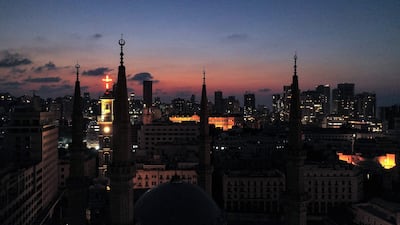When Lebanon turned 100 in September 2020, very few Lebanese celebrated. Many of them realised that, for all intents and purposes, their country had more or less ended as a commonwealth of the country’s sectarian communities. What remains is a dysfunctional place in which any shared sense of national community appears to be dead.
That’s not surprising, and everyday events only reaffirm this. A delegation from the International Monetary Fund visited Beirut two weeks ago, and the general impression after they had left was that the members of Lebanon’s political and financial elite have no intention of implementing IMF reforms to address the financial collapse of 2019.
In pursuit of their personal or sectoral interests, this elite prefers to do nothing rather than adopt reforms that might save at least a portion of the deposits of a large number of Lebanese. An estimated 80 per cent of the population lives below the poverty line.
In other words, the minimal responsibility of the political and financial leadership, which is to work for the benefit of the country’s population, is utterly absent. Instead, leaders help only their communities, and almost always only in ways that enhance their power over them, while doing nothing that can revive Lebanon as a nation.
However, it would be naive to assume that financial and economic reforms are a panacea for Lebanon’s problems. What collapsed in October 2019 was much more than the country’s economy. It was an entire system of governance that had emerged from the civil war of 1975-1990. This system was effectively a transposition of the wartime order to a peacetime order in which former militia leaders captured the state.
Sectarian wartime leaders took over ministries and began profiting from post-war reconstruction. The impresario of this post-war order was Rafiq Hariri, who had the credibility and energy to attract foreign capital. His appointment was the consequence of an understanding between Saudi Arabia and Syria, in which Mr Hariri would manage the economy and reconstruction while Syria would run political affairs.
Syrian dominance led to two main developments: the systematic undermining of constitutional principles, as Lebanon’s basic law was violated time and again, or manipulated in such a way that it created precedents that were entirely at odds with the intentions of the framers of the constitution.
And second, Syria decided that Hezbollah and other pro-Syrian groups would not be disarmed as most militias had been, because they were engaged in “resistance” against Israel. This allowed Hezbollah to build up a weapons arsenal so that in 2005, after the withdrawal of Syrian forces, the party emerged as the dominant force in Lebanon, imposing its will on all and contributing to the demise of the sectarian social contract.
And lest we blame only the Lebanese for what happened, the post-war system was blessed by the international community and the Arab world, who gave Syria free rein to impose its preferences on the country. Lebanon’s abandonment to former gunmen and to a Syrian regime that devastated its national institutions was a collective crime.
The reality today is that the Lebanese system has run its course. The shocking wastefulness of the post-war years, in which the financial order was built around funding the political and financial elite, is dead. Society has lost all confidence in the banking sector, which continues to rob them on a daily basis. The former governor of the central bank, Riad Salameh, for so long praised as the guru of Lebanon’s financial success, was shown to be a grifter who only delayed and compounded the country’s ruin.
Despite all this, the post-war ruling class appears to have no proposal to take Lebanon out of its mess. Now that they cannot unite around collectively plundering the state, the politicians are more divided than ever, agreeing only that IMF reforms could weaken their position by changing their way of doing things and generating popular unrest.
It’s in that context that we must understand Lebanon’s inability to rally around a unifying figure they can elect to the presidency. Constitutionally, the president is the “symbol of the nation’s unity”, except that today the presidency is nothing more than the embodiment of Lebanon’s chronic absence of unity. Therefore, in being incapable of agreeing on a successor to Michel Aoun, the country’s political forces have sounded the death knell of the Second Republic, which followed the Taif Accord of 1989.
Lebanon finds itself in a destructive limbo today – caught between a system that doesn’t work and that is rejected by a majority of the population, but that is also remarkably resilient because most Lebanese remain, paradoxically, loyal to their sectarian leaderships. In light of this stalemate, the country’s dissolution is likely to continue, with no prospect of resurrecting the system on more solid, consensual foundations.
As the system pursues its decline, other dynamics are coming into play to make any revival all but impossible. Hezbollah is profiting from the vacuum at the level of the state to expand its margin of manoeuvre and advance Iranian regional interests, not least on the Palestinian front. Thousands of Syrians are entering Lebanon every day, escaping the dire economic conditions in Syria, further altering Lebanese demographics.
Such developments will only increase sectarian anxieties and tensions, pushing all communities to harden their position. Even the war years were not as bad as things are today. The Lebanon my generation knew is gone. What remains is a crippled country that does not even have the means to acknowledge its own passing.


